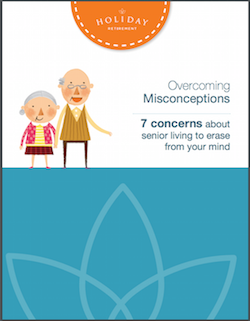
A recent survey of baby boomers by Holiday Retirement reveals their biggest hesitations about moving an aging loved one into a senior living community.
“When adult children consider a move for a parent or loved one, there are bound to be concerns,” says Jamison Gosselin, the Lake Oswego, OR-based company’s senior vice president of marketing, communications and resident enrichment. “However, it is important for these decision-makers to remember that this is an emotional decision and that through acknowledging and researching the realities of their concerns, they can address the reasons for those fears and make the best choice with an aging loved one.”
ORC International conducted the poll Sept. 9 to 13 among a sample of 1,000 adults aged 50 to 69 years. Respondents were selected from people who have volunteered to participate in online surveys and polls. Holiday Retirement released the results Jan. 18.
Thirty-seven percent of survey respondents said they would be somewhat or highly likely to move an aging parent or other loved one into a senior living community. The top seven concerns baby boomers have about senior living, however, according to the research:
1. Loss of independence: 70% of respondents said they worried that their loved one would lose his or her independence after moving into a senior living community.
2. Increased loneliness: 66% of participants said they were concerned that their loved one would be lonely after moving into a senior living. community.
3. Decreased attention: 65% of poll-takers expressed fear that a loved one living in a senior living community would not receive the same level of attention that he or she receives at home.
4. Boredom: 63% of survey respondents said they worried that a loved one would be bored after becoming a resident of a senior living community.
5. Boomer guilt: 61% of participants said they were concerned that they would feel guilty about moving their loved one into a senior living community.
6. Lack of funds: Almost 60% of poll-takers said they feared that their loved one did not not have enough money saved to live in a senior living community.
7. Worsening diet: 57% of survey respondents said they were worried that a loved one would not eat well as a senior living community resident.
Those who were highly concerned about senior living options tended to have children under the age of 13 at home, reflecting their “sandwich generation” status of caring for loved ones younger and older than themselves. Women also were more concerned than men with moving an aging loved one into a senior living community, reflecting the fact that women typically make the decisions related to healthcare for their families.
In conjunction with the survey, Holiday Retirement created a free, downloadable e-book for consumers that lists myths and realities related to senior living and how they can address their concerns. The company also created a checklist that adult children can use to help choose a senior living community for a parent or other loved one.
Holiday Retirement is the second-largest senior living operator in the United States, with more than 300 retirement communities across 43 states.



